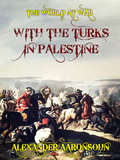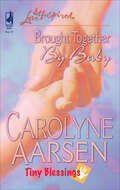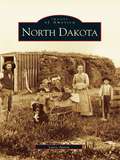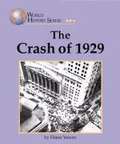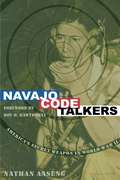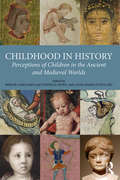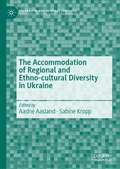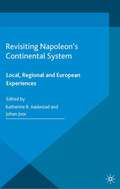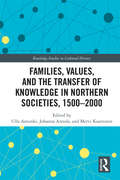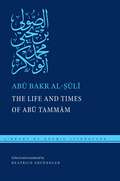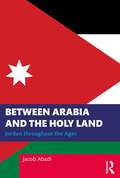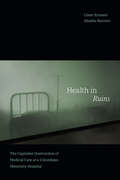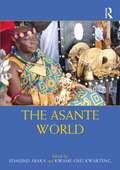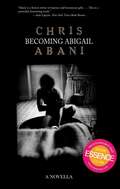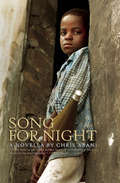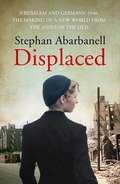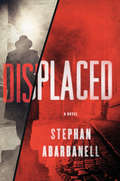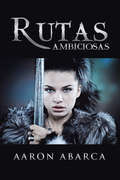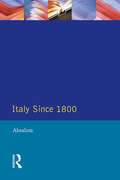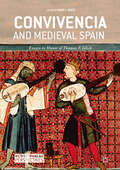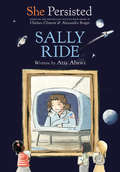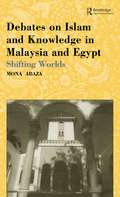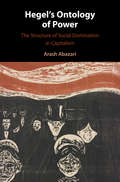- Table View
- List View
With the Turks in Palestine (The World At War)
by Alexander AaronsohnExcerpt: "While Belgium is bleeding and hoping, while Poland suffers and dreams of liberation, while Serbia is waiting for redemption, there is a little country the soul of which is torn to pieces—a little country that is so remote, so remote that her ardent sighs cannot be heard. It is the country of perpetual sacrifice, the country that saw Abraham build the altar upon which he was ready to immolate his only son, the country that Moses saw from a distance, stretching in beauty and loveliness,—a land of promise never to be attained,—the country that gave the world its symbols of soul and spirit. Palestine!"
Brought Together by Baby (Tiny Blessings #2)
by Carolyne AarsenTo: Anne, Meg, PilarFrom: RachelRe: Updates on Mom, baby Gracie and the hunky doc!Well, Mom is making great strides in physical therapy, and taking care of Gracie is an unexpected joy. Because my adopted little sister was a preemie, she's had lots of checkups...and her green-eyed pediatrician is gorgeous! Each time we visit Eli Cavanaugh, he makes me want to embrace life, finally let my hair out of its almost-daily bun and dream a little. I have to tell you, being temporary mommy is making me long for a family of my own...with Eli!
North Dakota
by Larry AasenDuring the early years of the 20th century, American families witnessed amazing changes in their daily lives--the arrival of plumbing and electricity in their homes, the first automobiles, and thanks to the Eastman Kodak Company, the first affordable, portable, photographic instrument, the box camera. Many families purchased the box camera (for $1) and began to document their own histories. It is upon these histories that North Dakota places its focus.Nowhere were the changes so dramatic as on the Great Plains, and in the state of North Dakota especially. Due to the huge influx of immigrants, mostly from Scandinavia, the state's population more than doubled from 1900 to 1940, roughly the period covered in North Dakota. But this was also a time ofhardship and struggle, as the Great Depression, theDustbowl, and war took their toll on North Dakotafamilies. But through hard work and perseverence, most of these families survived, and thrived, and nowshare with us the story of that time.
The Crash of 1929
by Nathan AasengAlmost overnight, the hopes, dreams, and life savings of millions of Americans were wiped out when the stock market crashed in October of 1929, and ushered in the Great Depression. This book tells how the unthinkable happened, and how the crash changed the course of history.
Navajo Code Talkers
by Nathan Aaseng<p>On the Pacific front during World War II, strange messages were picked up by American and Japanese forces on land and at sea. The messages were totally unintelligible to everyone except a small select group within the Marine Corps: the Navajo code talkers-a group of Navajos communicating in a code based on the Navajo language. This code, the first unbreakable one in U.S. history, was a key reason that the Allies were able to win in the Pacific. <p>Navajo Code Talkers tells the story of the special group, who proved themselves to be among the bravest, most valuable, and most loyal of American soldiers during World War II.</p>
Childhood in History: Perceptions of Children in the Ancient and Medieval Worlds
by Reidar Aasgaard Cornelia HornInquiring into childhood is one of the most appropriate ways to address the perennial and essential question of what it is that makes human beings – each of us – human. In Childhood in History: Perceptions of Children in the Ancient and Medieval Worlds, Aasgaard, Horn, and Cojocaru bring together the groundbreaking work of nineteen leading scholars in order to advance interdisciplinary historical research into ideas about children and childhood in the premodern history of European civilization. The volume gathers rich insights from fields as varied as pedagogy and medicine, and literature and history. Drawing on a range of sources in genres that extend from philosophical, theological, and educational treatises to law, art, and poetry, from hagiography and autobiography to school lessons and sagas, these studies aim to bring together these diverse fields and source materials, and to allow the development of new conversations. This book will have fulfilled its unifying and explicit goal if it provides an impetus to further research in social and intellectual history, and if it prompts both researchers and the interested wider public to ask new questions about the experiences of children, and to listen to their voices.
The Accommodation of Regional and Ethno-cultural Diversity in Ukraine (Federalism and Internal Conflicts)
by Aadne Aasland Sabine KroppThe book offers new insights into how ethnicity, language and regional-local identity interact within the context of Ukrainian political reform, and indicates how these reforms affect social cohesion among ethno-cultural groups. While the individual chapters each focus on one or a few facets of the overall research question, together they draw a nuanced picture of the multifaceted challenges to creating and consolidating social cohesion in a nationalizing state. The concept integrates various disciplines, including political science, international relations, law, and sociology. Correspondingly, the contributions are based on various methodological approaches, ranging from legal analysis over media discourse analysis, individual and focus group interviews to analysis of data from a representative population survey. The findings of the in-depth study are discussed within the broader context of comparative research on diversity management and social cohesion in fragmented societies.
Revisiting Napoleon’s Continental System: Local, Regional and European Experiences (War, Culture and Society, 1750-1850)
by K. Aaslestad J. JoorEconomic warfare during the Napoleonic era transformed international commerce; redirecting trade and generating illicit commerce. This volume re-evaluates the Continental System through urban and regional case studies that analyze the power triangle of the French, British and neutral powers and their strategies to adapt to trade restrictions.
Revisiting Napoleon’s Continental System
by Katherine B. Aaslestad Johan JoorNapoleonic warfare spread to the high seas, harbors and marketplaces across Europe and the Atlantic through the Continental System. This volume addresses the illicit commerce, new merchant networks, 'daily life', and tensions with neutral states generated by Anglo-French economic warfare. It also reveals the contradictions inherent in the Napoleonic Empire - at once rational and progressive, but also coercive and exploitative. Regional and urban case studies offer a more complete understanding of the significance of economic warfare during the Napoleonic era, and explore the experiences and consequences of the conflict through several key themes: a re-evaluation of the historiography of the Continental System, the uneven power triangle of the French, British and neutral powers, and the strategies of merchants and smugglers to adapt to or circumvent the system. Transnational case studies underscore the vulnerability and ingenuity of Europeans as they faced transformative social and economic challenges.
Families, Values, and the Transfer of Knowledge in Northern Societies, 1500–2000 (Routledge Studies in Cultural History #66)
by Ulla Aatsinki Johanna Annola Mervi KaarninenThis edited collection sheds light on Nordic families’ strategies and methods for transferring significant cultural heritage to the next generation over centuries. Contributors explore why certain values, attitudes, knowledge, and patterns were selected while others were left behind, and show how these decisions served and secured families’ well-being and values. Covering a time span ranging from the early modern era to the end of the twentieth century, the book combines the innovative "history from below" approach with a broad variety of families and new kinds of source material to open up new perspectives on the history of education and upbringing.
Fantasy and Mystery: 10 Authors measure themselves against the great Mysteries of our History.
by AavvFantasy and Mystery by AAVV 10 Authors measure themselves against the great Mysteries of our History. Fantamisteri, Fantastic Mysteries, Fantasy and Mystery ... many different ways (even if we recognized ourselves more in the first one) to define this collection of stories, written by ten different authors, who wanted to try to investigate the Mystery and the Fantastic, ranging from History to Fantasy, from the Yellow that is tinged with Horror to the Thriller that borders on Science Fiction, from Time Travel to Esotericism, from ancient Relics to Fantahorror, with a pinch of Eroticism ... In short, the authors have indulged themselves, each based on to one's own culture, one's creativity, one's favorite themes of inspiration, in telling stories in which the Mystery and the Fantastic are the two pivots around which the narrated events revolve. What unites these stories, albeit so different in terms of themes, style, reasons of inspiration? The fact of having chosen famous people from History, Literature, Cinema, as protagonists, and having made them interact with equally famous objects, environments, situations, places. In fact, it goes from the Alchemical Caves to the Bermuda Triangle, from the Holy Grail to the Holy Shroud, with characters such as Constantine emperor, John Fitzgerald Kennedy, D'Artagnan, the Wizard Merlin, Don Giovanni, Annibale, Agatha Marple, George Orwell, Tolkien , Wagner as protagonists and not only, because alongside the great there is also a number of characters who at first glance may seem "minor" but who, instead, are functional to the story and enrich it.
The Life and Times of Abū Tammām (Library of Arabic Literature #59)
by Abū Bakr al-ṢūlīA robust defense of a poetic geniusAbū Tammām (d. 231 or 232/845 or 846) is one of the most celebrated poets in the Arabic language. Born in Syria to Greek Christian parents, he converted to Islam and quickly made his name as one of the premier Arabic poets in the caliphal court of Baghdad, promoting a new style of poetry that merged abstract and complex imagery with archaic Bedouin language. Both highly controversial and extremely popular, this sophisticated verse influenced all subsequent poetry in Arabic and epitomized the “modern style” (badīʿ), an avant-garde aesthetic that was very much in step with the intellectual, artistic, and cultural vibrancy of the Abbasid dynasty.In The Life and Times of Abū Tammām, translated into English for the first time, the courtier and scholar Abū Bakr Muḥammad ibn Yaḥyā al-Ṣūlī (d. 335 or 336/946 or 947) mounts a robust defense of “modern” poetry and of Abū Tammām’s significance as a poet against his detractors, while painting a lively picture of literary life in Baghdad and Samarra. Born into an illustrious family of Turkish origin, al-Ṣūlī was a courtier, companion, and tutor to the Abbasid caliphs. He wrote extensively on caliphal history and poetry and, as a scholar of “modern” poets, made a lasting contribution to the field of Arabic literary history. Like the poet it promotes, al-Ṣūlī's text is groundbreaking: it represents a major step in the development of Arabic poetics, and inaugurates a long line of treatises on innovation in poetry.A bilingual Arabic-English edition.
Between Arabia and the Holy Land: Jordan throughout the Ages
by Jacob AbadiThis volume is a general survey of the history of Jordan from ancient times to the present.The author covers the major events that took place in this region since ancient times. Starting with the history of the region in Biblical times, the author discusses the major developments in the ancient kingdoms of Edom, Moab, and Amon, which shared common borders with the Hebrew kingdoms. He then provides a detailed coverage of the events that took place during the Nabatean period.The author demonstrates how the character of this region had changed with the rise of Islam and the expansion of the Arabs and their encounter with the Byzantines. In addition, the author demonstrates how the rise of the Mamluk Sultanate affected the region. The author provides a detailed analysis explaining how the Hashemite Kingdom Jordan emerged and how the Ottomans and the British contributed to its rise. In addition to the political developments that took place in this region, the reader will become familiar with the economic, social, and cultural developments which contributed to the emergence of the modern Hashemite Kingdom. The book’s audience includes college undergraduates, graduates, postgraduates, scholars, as well as lay readers with interest in this strategically important region.The book is based on primary and secondary sources written in several languages.
Health in Ruins: The Capitalist Destruction of Medical Care at a Colombian Maternity Hospital (Experimental Futures)
by César Ernesto Abadía-BarreroIn Health in Ruins César Ernesto Abadía-Barrero chronicles the story of El Materno—Colombia’s oldest maternity and neonatal health center and teaching hospital—over several decades as it faced constant threats of government shutdown. Using team-based and collaborative ethnography to analyze the social life of neoliberal health policy, Abadía-Barrero details the everyday dynamics around teaching, learning, and working in health care before, during, and after privatization. He argues that health care privatization is not only about defunding public hospitals; it also ruins rich traditions of medical care by denying or destroying ways of practicing medicine that challenge Western medicine. Despite radical cuts in funding and a corrupt and malfunctioning privatized system, El Materno’s professors, staff, and students continued to find ways to provide innovative, high-quality, and noncommodified health care. By tracking the violences, conflicts, hopes, and uncertainties that characterized the struggles to keep El Materno open, Abadía-Barrero demonstrates that any study of medical care needs to be embedded in larger political histories.
The Asante World (Routledge Worlds)
by Edmund Abaka Kwame Osei KwartengThe Asante World provides fresh perspectives on the Asante, the largest Akan group in Southern Ghana, and what new scholars are thinking and writing about the "world the Asante made." By employing a thematic approach, the volume interrogates several dimensions of Asante history including state formation, Asante-Ahafo and Bassari-Dagomba relations in the context of Asante northward expansion, and the expansion to the south. It examines the role of Islam which, although extremely intense for just a short time, had important ramifications. Together the essays excavate key aspects of Asante political economy and culture, exemplified in kola nut production, the kente/adinkra cloth types and their associated symbols, proverbs, and drum language. The Asante World explores the Asante origins of Jamaican maroons, Asante secular government, contemporary politics of progress, governance through the institution of Ahemaa or Queenmothers, epidemiology and disease, and education in the twentieth and twenty-first centuries. Featuring innovative and insightful contributions from leading historians of the Asante world, this volume is essential reading for advanced undergraduates, postgraduates, and scholars concerned with African Studies, African diaspora history, the history of Ghana and the Gold Coast, the history of Islam in Africa, and Asante history.
Becoming Abigail
by Chris AbaniA breathtaking new novella from the award-winning author of GraceLand "Compelling and gorgeously written, this is a coming-of-age novella like no other. Chris Abani explores the depths of loss and exploitation with what can only be described as a knowing tenderness. An extraordinary, necessary book."—Cristina Garcia, author of Dreaming in Cuban "Abani's voice brings perspective to every moment, turning pain into a beautiful painterly meditation on loss and aloneness."—Aimee Bender, author of The Girl in the Flammable Skirt “Abani's empathy for Abigail's torn life is matched only by his honesty in portraying it. Nothing at all is held back. A harrowing piece of work.”—Peter Orner, author of The Esther Stories Tough, spirited, and fiercely independent Abigail is brought as a teenager to London from Nigeria by relatives who attempt to force her into prostitution. She flees, struggling to find herself in the shadow of a strong but dead mother. In spare yet haunting and lyrical prose reminiscent of Marguerite Duras, Abani brings to life a young woman who lives with a strength and inner light that will enlighten and uplift the reader.
Song for Night
by Chris AbaniPart Inferno, part Paradise Lost, and part Sunjiata epic, Song for Night is the story of a West African boy soldier’s lyrical, terrifying, yet beautiful journey through the nightmare landscape of a brutal war in search of his lost platoon. The reader is led by the voiceless protagonist who, as part of a land mine-clearing platoon, had his vocal chords cut, a move to keep these children from screaming when blown up, and thereby distracting the other minesweepers. The book is written in a ghostly voice, with each chapter headed by a line of the unique sign language these children invented. This book is unlike anything else ever written about an African war.
Displaced
by Stephan AbarbanellIt is 1946, and the full horrors of the previous six years are slowly coming to light.But in Jerusalem, Elias Lind can't accept that his brother Raphael really did die in a concentration camp. He has evidence that the scientist is still alive but, unable to search for him himself, he persuades a young member of the Jewish resistance to help. Lilya's search for Raphael takes her from the dusty streets of Jerusalem to the heart of political London, from US-controlled Munich to an overcrowded and underfunded displaced persons camp, before leading her to the devastated shell of Berlin itself. But before long Lilya realises that she isn't the only one searching for the missing scientist; a mysterious pursuer is hot on her heels, and it soon becomes clear that Raphael's life isn't the only one in question . . .Displaced is a deeply intelligent thriller about how the actions of a few can change the course of history. It is about the making of a new world from the ashes of the old, and decisions taken whose consequences are still with us today.
Displaced: A Novel
by Stephan AbarbanellEchoing the fiction of Joseph Kanon, Alan Furst, and Daniel Silva, this deeply intelligent debut literary thriller—set within a world still reeling from World War II—explores how the actions of a few can change the course of history.British-occupied Palestine, 1946: Elderly writer Elias Lind isn’t convinced by reports that his scientist brother, Raphael, died in a concentration camp. Too frail to search for Raphael himself, Elias persuades a contact in the Jewish resistance to send someone in his place.Lilya joined the resistance movement to help form a new state, not to waste her time on a fruitless chase across a war-ravaged continent at the request of a frail, most likely delusional, old man. As her comrades make their final preparations for a major operation, a bitter Lilya must accept her orders and embark on her journey to Europe. She is traveling as a member of the American Jewish Joint Distribution Committee, one of the largest aid organizations for Jewish survivors—many of whom survived the Nazis only to find themselves with no family or home to return to. If Raphael is alive, odds are she will find him among the refugees trapped in displaced persons camps and prevented from immigrating to Palestine by the British.Lilya’s search leads her from the hushed corridors of London’s Whitehall, home to the British Secret Intelligence Service, to the haunted, rubble-strewn strasses of Munich and Berlin. Visiting Föhrenwald, an overcrowded and underfunded DP camp, she makes a breakthrough. But Lilya isn’t the only person pursuing the missing man. Someone has been mirroring her every move—a dangerous adversary who will go to drastic lengths to find Raphael first.
Rutas ambiciosas
by Aaron AbarcaLas ambiciones son el anhelo de tu futuro, porque vuestro presente jamás está satisfecho. El sanguinario Dante, rey de la tribu de los Zuge, alentado por una codicia sin límites ansía hacerse con el control de todo Hasme. En mitad de la batalla, una certera flecha disparada por su amada, Mía, acaba con su vida. Pero Tánatos, el dios de la muerte, le reserva un castigo al difunto monarca: convertido en un espectro velará los pasos de su amada para toda la eternidad. Zetros, quien fuera el hombre de confianza de Dante, es ahora el nuevo rey de los Zugue. Decidido a enmendar los errores de su antecesor y poner fin a la barbarie pide ayuda a Gabriel, príncipe de la tribu de los Ibekanis, su aliado en su lucha contra las huestes del comandante Hawk, al mando de las tropas militares. Mientras tanto, en el Norte, el coronel Fausto obedece órdenes de mantener el estado en paz y armonía... Una nueva batalla acaba de comenzar. Una lucha donde el ingenio, la pasión y la ambición determinarán el futuro de estos hombres y guiarán sus pasos hacia la victoria final.
Italy Since 1800: A Nation in the Balance? (The Present and The Past)
by Roger AbaslomSince unification, Italy has grown from a backward agrarian society into one of the world's leading industrial powers. Yet her history exhibits spectacular disunities, inconsistencies and paradoxes. Dominated by political Catholicism, she has also been home to Fascism, the mafia, and the largest Communist movement outside the Eastern Bloc. Her politics are notoriously fissiparous - yet policy itself never changes. Until now. This timely, absorbing and richly illustrated account of the historical development of the Italian nation-state traces the main paradoxes of what `Italy' has been, and questions what she may become.
Convivencia and Medieval Spain: Essays in Honor of Thomas F. Glick (Mediterranean Perspectives)
by Mark T. AbateThis volume is a collection of essays on medieval Spain, written by leading scholars on three continents, that celebrates the career of Thomas F. Glick. Using a wide array of innovative methodological approaches, these essays offer insights on areas of medieval Iberian history that have been of particular interest to Glick: irrigation, the history of science, and cross-cultural interactions between Jews, Christians, and Muslims. By bringing together original research on topics ranging from water management and timekeeping to poetry and women’s history, this volume crosses disciplinary boundaries and reflects the wide-ranging, gap-bridging work of Glick himself, a pivotal figure in the historiography of medieval Spain.
Sally Ride
by Atia Abawi Chelsea ClintonInspired by the #1 New York Times bestseller She Persisted by Chelsea Clinton and Alexandra Boiger comes a chapter book series about women who stood up, spoke up and rose up against the odds! <p><p>As the first American woman in space, Sally Ride broke barriers and made her dreams come true. But she wanted to do even more! After leaving NASA, she created science and engineering programs that would help other girls and women make their dreams come true as well. <p><p>In this chapter book biography by award-winning author Atia Abawi, readers learn about the amazing life of Sally Ride--and how she persisted. Complete with an introduction from Chelsea Clinton!
Debates on Islam and Knowledge in Malaysia and Egypt: Shifting Worlds
by Mona AbazaThis book is a comparative study of the sociological field in two different Muslim societies: Malaysia and Egypt. It analyses the process of the production of 'knowledge' through the example of the modern 'Islamization of knowledge debate' and local empirical variations.
Hegel's Ontology of Power: The Structure of Social Domination in Capitalism
by Arash AbazariRecent attempts to revitalize Hegel's social and political philosophy have tended to be doubly constrained: firstly, by their focus on Hegel's Philosophy of Right; and secondly, by their broadly liberal interpretive framework. Challenging that trend, Arash Abazari shows that the locus of Hegel's genuine critical social theory is to be sought in his ontology – specifically in the 'logic of essence' of the Science of Logic. Mobilizing ideas from Marx and Adorno, Abazari unveils the hidden critical import of Hegel's logic. He argues that social domination in capitalism obtains by virtue of the illusion of equality and freedom; shows how relations of opposition underlie the seeming pluralism in capitalism; and elaborates on the deepest ground of domination, i.e. the totality of capitalist social relations. Overall, his book demonstrates that Hegel's logic can and should be read politically.
